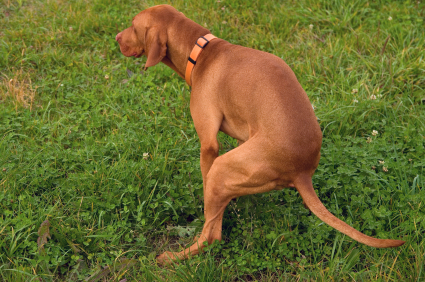 Image from: The Poo Prejudice | The Arid Land Homesteaders League www.plantfreak.wordpress.com
Image from: The Poo Prejudice | The Arid Land Homesteaders League www.plantfreak.wordpress.com
Okay, here is something rather interesting that I came across today. Scientists have discovered that dogs will align their bodies with the Earth's magnetic field before excretion. What is even more amazing is that the scientists actually observed over 5,000 pee breaks and over 1,800 defecations to come to this conclusion. Their findings suggest that when the magnetic field is stable, dogs will stand in-line with the North-South axis while avoiding the East-West axis. However, when the field varied slightly, dogs no longer copped-a-squat along the North-South axis.
Now I know why my dog has to pick just the right position before taking care of business.
So, does this eliminate the need for a compass on long walks with the dog??
Source:
Hart et al., Dogs are sensitive to small variations of the Earth's magnetic field. Frontiers in Zoology. 10:80, 2013. doi:10.1186/1742-9994-10-80

I have to admit, your compass idea made me laugh...
This is a really interesting discovery---I guess the next question is, Why? Or, How?
The real question is, who figured this out? What brilliant madman noticed this?
Question: what if any consistency was observed in regard to the direction the dog's head pointed? That is, to what degree did their heads consistently point toward a single direction (and which was it?), or did they sometimes point North and sometimes point South with no particular pattern or preference?
If the findings can be replicated, the next step should be to start looking for whether the dog's magnetic field sensors are in its brain or elsewhere in its body. Next step after that would be to seek out the actual cellular mechanism used.
Re. taking dogs camping: it would not surprise me if one or more tribal cultures relied on dogs for direction-finding, and even were aware of their pee/poo behavior in relation to the axes of the compass.
Other: human anecdote: I've always set up my bedroom with my bed such that my head points as closely as possible toward geographic North while sleeping. When my head isn't pointing approximately North during a night's sleep, I have transient feelings of disorientation and difficulty with directions. Anecdotes != data, but it would be interesting to find out if humans in general have individual preferences in compass direction while sleeping, as this might point to a magnetic field sense in humans.
humans do too! Some groups of people do it south to north direction whenever time is.
G of California USA I enjoyed your comments - so refreshing to see intelligent thoughts about Blogs. I am with you re. replicate the data and find out where the sensors are located? There is a researcher in the UK who found foxes and other animals who hunt for prey under the snow or ground will orient themselves in a specific direction before they pounce. Purpose? Nice to have some things still being a mystery for us all to ponder. Happy New Year. JESleeth Canada
It’s really too interesting and makes laugh lot. It thinks there is yet too many to discover. Do they will have some magnetic sensations? Recently I’d a magnetometer from Gem System, Ontario which is used to find direction. It’s made me wonder that the with the help of dogs, we can find out the proper direction. More research has to be done on this and it will be a boon.
I myself am a dog lover and I find this amazing. Our natural instincts are incredible. I guess the obvious question is how do the dogs know when the magnetic field is stable or not, also, how did someone notice this pattern? I can only imagine how this will enhance magnetoreception research!
These findings are quite interesting. it makes me wonder whether dogs are sensitive to other magnetic occurrences for example magnetic storms. I read an article that said the study only found calm magnetic fields 30% of the time during the study. What did the dogs do when the magnetic fields weren't calm? Studies still need to conclude with which part of the body or with what sense the dogs senses the magnetic fields.